|
This coming Sunday, to close out the Easter Octave, we will celebrate Divine Mercy Sunday. Devotion to Divine Mercy started with St. Faustina in the early 1900s and Divine Mercy Sunday became officially recognized by Pope John Paul II in 2000 along with the canonization of St. Faustina. Growing up, I would hear a homily about the image of Divine Mercy every Divine Mercy Sunday, but it wasn’t until I was introduced to the Divine Mercy Chaplet that I began to understand more about the overall message of Divine Mercy.
The Chaplet of Divine Mercy is a devotion that was started by St. Faustina from her visions of Jesus. It is a series of prayers that can be said on rosary beads, albeit usually much quicker than a rosary, that is especially connected to Divine Mercy Sunday. What particularly strikes me about the Divine Mercy Chaplet is how many of the prayers end with “us and the whole world.” Both the Eternal Father prayer, the prayer said on the “Our Father” beads, and the prayer said on each of the “Hail Mary” beads ends with this emphasis on “us and the whole world.” I began to understand what Divine Mercy meant when I thought about mercy not just in terms of myself, but about the whole world, both my closest friends and people I had never met. The message of Divine Mercy is that through the mercy Jesus shows us, we are called to be merciful and in harmony with all of our brothers and sisters throughout the world. Our inward journey of mercy ultimately leads us outward to living a merciful life. For me, I am reminded of the Beatitudes and the call for everyone to be merciful, peacemakers, and more (Matthew 5:3-12). However, I have found myself struggling with how I, a college student, can live out this mercy to the “whole world.” How can I show mercy to the “whole world” during the COVID-19 pandemic when we cannot travel? These are some of the questions I find myself grappling with when thinking about how to live out a life of Divine Mercy. When I think about Divine Mercy, I think about God’s abundant love for us and how we are called to share that love with all our brothers and sisters. In that, I mainly think about community service opportunities I have had while in college to go on both service and justice immersion trips around the country, as well as locally in Washington, DC. But I also thought about doing little acts of service throughout the day. I think just as we can do little acts of service throughout the day, we can do little acts of mercy to spread a consistent ethos of mercy. As Mother Teresa is attributed with saying, “we cannot all do great things. But we can do small things with great love.” In my daily life, I have learned that there are many ways that we can treat people with mercy and love, bringing the ethos of Divine Mercy to our daily lives. A lot of this includes little things, such as: not getting upset when the cafeteria food takes twice as long as normal to be made, receiving and giving criticism in group projects and assignments with love rather than having an attitude of superiority, and being adaptable and understanding when situations change, especially with COVID-19. Over the years I have seen some commercials advertising “pass it on” campaigns in terms of good deeds, but I think that idea also applies to living in a merciful and loving way. Our mercy spreads to the “whole world” through us being merciful to someone who is in turn merciful to many more people. As we approach and celebrate this Divine Mercy Sunday, let us think about ways that we can live a life of Divine Mercy every day. “Extend your mercy towards others, so that there can be no one in need whom you meet without helping. For what hope is there for us if God should withdraw His Mercy from us?” – Saint Vincent de Paul (attributed) To learn more about the corporal and spiritual works of mercy, please click here.
0 Comments
Jesus gives us one of his greatest challenges in the Gospel for today. He says, “Stop judging and you will not be judged. Stop condemning and you will not be condemned. Forgive and you will be forgiven…For the measure with which you measure will in return be measured out to you.” (Lk. 6:27-28) While the last paragraph of this passage is the part that is most often quoted, the first two-thirds are just as challenging. In his words leading up to the well-known “judge not lest ye be judged,” the Lord calls us to be better than just taking the easy way out. Speaking to his disciples, Jesus said, “To you who hear I say, love your enemies, do good to those who hate you, bless those who curse you, pray for those who mistreat you. To the person who strikes you on one cheek, offer the other one as well, and from the person who takes your cloak, do not withhold even your tunic. Give to everyone who asks of you, and from the one who takes what is yours do not demand it back.” The key word is everyone.
He says, “For if you love those who love you, what credit is that to you? Even sinners love those who love them.” He reminds us that the easy way out won’t get us very far in the eyes of God. So you do good to those who do good to you? Even sinners do that. Think, Jesus constantly argued with the Pharisees who were quick to judge others but not themselves: “Why do your disciples pick grain on the sabbath? Why do you dine with sinners and tax collectors?” (emphasis added). Jesus’ response is this, “But rather, love your enemies and do good to them… then your reward will be great and you will be children of the Most High, for he himself is kind to the ungrateful and the wicked. Be merciful, just as also your Father is merciful.” To be merciful, to love even those who we find hardest to love, is to participate fully in the life of God who is merciful. We see Jesus’ command to not judge or condemn taken to extremes on either side. On the one hand, we can take this command to mean that we cannot correct or rebuke someone for their actions, even actions that are harmful to themselves or others. “Jesus said not to judge,” is often used as an excuse for the relativism that permeates our society. We can’t judge what someone else believes. In fact, to even suggest objective truth could be seen as condemnatory or judgmental and, therefore, we can’t do that. On the other hand, some will merely ignore Jesus’ words and condemn others as sinners, which we all are. If we ignore Jesus’ words, we risk putting ourselves on a pedestal, seeing ourselves as the good people and those other sinners as unclean and unworthy of my love and God’s love. In fact, Jesus is calling us to the middle ground. We believe in truth and that people can, in fact, be wrong. With patience and charity, we can judge an action to be right or wrong, but never in condemnation of the person—that judgement is God’s alone. Indeed, it is that understanding that God alone can judge a person’s heart that we must remember at all times, in all of our relationships and interactions. When we love others, friends and enemies, when we save condemnation and judgement of one’s heart for him alone who can do so (the Almighty God), then “For the measure with which you measure will in return be measured out to you.” Lord, Jesus Christ son of God, have mercy on me, a sinner. To learn more about our call to mercy, please click here. “Through your infinite mercy… destroy in me all my cruelty; give me your mercy, transform me in your mercy, and let my life be a life only of works of corporal and spiritual mercy for the benefit of all.” - St. Vincent Pallotti If one goes online right now, he or she will find many uplifting posts on social media. But all too often, there are also cruel attacks aimed at one another—even by practicing Catholics. Yet, as St. Vincent Pallotti reflected on and experienced, God is infinite love and mercy. In and through our experience of God’s mercy and love, we are challenged to live both out in our interactions with others both physically and online. As St. Vincent Pallotti attested to, the Corporal and Spiritual Works of Mercy are fundamental to our growth and spiritual lives. Everyone knows there is suffering of all sorts in our world. Why would a Christian want to add intentionally to that suffering? Sometimes, this can be done unintentionally through sins of omission. As we say at Mass during the Confiteor, we ask forgiveness for “what I have done and in what I have failed to do.” Doing the Corporal and Spiritual Works of Mercy can aid us in examining our consciences. We can then seek forgiveness and mercy from God, especially in the frequent celebration of the Sacrament of Penance which helps us experience more deeply the infinite mercy and love of God. From there, we go forth witnessing to others what we ourselves have experienced. Pope Francis reminds us: “Mercy towards a human life in a state of need is the true face of love” (Angelus, July 14, 2019). Instead of causing suffering, we are called to compassion—to suffer with another. This is not easy, but practicing the Corporal and Spiritual Works of Mercy will assist us in learning and living a compassionate, merciful, and loving way of life in Christ. May we pray with St. Vincent Pallotti to be transformed in God’s mercy for the benefit of all. May the charity of Christ urge us on!
I watched her curly little head bounce away from me further down the hiking path and around a bend, out of my sight. I knew her older brothers would slow down so she could keep up with them, taking her under their wings. In the midst of a global pandemic, the woods were a safe space, open and free from the danger that seems to lurk everywhere these days. Nonetheless, my heart rate picked up along with my pace. What if a stranger was on the path? What if she fell and got hurt? I couldn’t see the path ahead, and I was afraid. I hurried along, my anxiety increasing as my steps forward failed to lead me to a view of my children. My thoughts turned dark while the woods around me became bright. Trapped in my own head, I failed to notice the sun breaking through, filtering light through the treetops. Until—there! The sunshine reflecting off of my little girl’s sequin covered sneakers allowed me to catch a glimpse of my babies. “Red light!” I yelled, in our family shorthand for “stop-moving-your-body-immediately.” The birds scattered, startled. My children froze in place as they waited for me to catch up with them. As I knew they would be, the boys were watching closely over their little sister. Taking her by the hand, they coached her through the mud and over the fallen branches. “See, Mama? Pretty!” my curly little girl exclaimed, joyfully depositing semi-crushed wildflowers into my hands. After rubbing her nose against mine, she joined her brothers on a moss-covered log, not registering my fear for even a moment. Exhaling a sigh of relief, I praised God in joy for great big brothers, my safe little girl, and a Father who is Light, illuminating the way. In this season of uncertainty, I find myself living that moment on the hiking path time and again: rushing forward, afraid, unable to see what is ahead. My days are filled with research and passionate conversation about schooling, and what the right choice for our family will be this fall. We deliberate over each barbecue invitation and mourn the loss of birthday celebrations that will never come to life. Parenting in a season where change is the only constant is overwhelming. I’m living that moment on the hiking path again: where I could not see, there was light. Though I was afraid, the Father was before me, protecting my little ones. So now, instead of remaining trapped by my thoughts, I am pursuing His power and protection. I am practicing seeking the light. In his letter to the Colossians, St. Paul reminds us that we can live in joy even in the midst of hardship, and he shows us how: “[We are] strengthened with every power, in accord with His glorious might, for all endurance and patience, with joy giving thanks to the Father who has made you fit to share in the inheritance of the saints in light. He delivered us from the power of darkness and transferred us to the kingdom[...]”(Colossians 1:11-12). Joy is a pursuit. By God’s great mercy, we are called out of the darkness and into the light. We are invited to share in the inheritance of the saints, if only we can pursue His power and glorious might instead of depending upon our own. When left to myself, I abandon joy for the hopelessness and despair that seems to permeate the world during this pandemic. However, when I pursue the heart of Christ, I am promised endurance and patience. I am equipped to face the reality of a sick and broken world and to remain unbroken by its weight. In His power alone, joy still abounds. Joy is a practice. Turning hands full of crushed wildflowers to praise comes with intentionality. So: let us train ourselves to joy. When we feel the dark closing in on us, we are called to joyfully give thanks to the Father and to seek His fingerprints that so graciously mark our lives—to acknowledge His many gifts. When the trees block our view, let us enjoy the sunshine filtering through their branches. When the path is rocky and unsure, let us acknowledge that He walks alongside us, and before us. When we suffer through sickness, hardship, and isolation, let us hope in God who has overcome suffering once and for all. This is joy. Grace-filled moments of contentment, happiness, peace, safety, and hope that we open our eyes to experience, even in the midst of the dark. Where happiness is fleeting and circumstantial, joy is ours to keep no matter the circumstance. Along this path I will stumble and fall. Joy will evade me as I am burdened by fear and uncertainty. But I will allow the Lord to raise me up, seeking the joy He offers me despite my skinned knees. Like my curly girl, I choose to trust that I am not alone. I choose wildflowers and light. I chase joy.
Have you ever evangelized in the streets? St. Vincent Pallotti did in the Rome of his day. He would go to a piazza and begin preaching. People would gather around. Some priests even judged him for engaging in this type of evangelization because they considered it beneath his dignity as a priest. However, he knew that many people did not come to church. Pallotti believed that the Church needed to go to people and not wait for people to come to church. These truths hold firm today. This is the call of all the baptized. We are sent by Christ into the world to preach his Gospel by word and deed – to be his witness in the world as his apostles or missionary disciples. Pallotti wanted to preach not only to those who did not believe, but also to Catholics in order to revive their faith. It may seem strange to evangelize in the streets, but in my hometown of Hammonton, New Jersey, Catholics have been doing so for 145 years. Every year, Catholics in the community have participated in an annual procession through the streets of the town in honor of the Blessed Virgin Mary under the title of Our Lady of Mt. Carmel, whose feast day is today. This is a very public display of faith that spills out from the church building and into the streets—mirroring the work of Pallotti. We are told “Go” at the end of Mass, but go and do what? Go into the streets, not only the literal ones, but also the ones online. We are moved outward by Christ. Our faith in Jesus Christ and our experience of his infinite love and mercy is not our private matter. Nor is it ours to decide the quality of another’s life of faith. Our mission is to witness Christ to all we encounter and accompany them into an encounter with him, in and through the community of faith, the Church. Through good accompaniment, sincere community, and deeper conversion, all can come to know that they are sent by Christ. May the charity of Christ urge us on! “What can I do?” The question reverberates within us while we stay home during the COVID-19 pandemic. To stay home often implies inaction, disengagement, fear. However, staying home during this unprecedented time is one of the most charitable actions we can make. To stay home is not to surrender or turn inward, but to care so much for the greater good that we are willing to make sacrifices to our daily life in order to protect our neighbor. This calls for a radical mentality shift. As human beings, we have a tendency toward action. Even on a scientific level, the world is constantly in motion. Human beings want to do something with the hands given us and the breath in our lungs. We want to act. And in times of crises, we want to help. Perhaps this is more urgently felt by people of faith; it is intertwined in our very identity as baptized persons and is a living, breathing part of our spiritual life. We live out of the reality that “faith…if it does not have works, is dead.” So during a time when one of the greatest acts of charity we can physically do is stay at home, we still find ourselves asking “what can I do?” The good news is, we can still “do” a lot. With the corporal and spiritual works of mercy as a guide, I’ve compiled a list of ten ideas for alleviating suffering and spreading the Gospel during the novel coronavirus pandemic.
There are many ways we can live the corporal and spiritual works of mercy during this outbreak of COVID-19. What are some others ways you have shared the Good News and brought love and joy to others during this time? Click here to learn more about the Corporal and Spiritual Works of Mercy. 1. Have Trust in the Lord: In every situation, Pallotti sought the will of God. Any difficult situation should not discourage us to doubt the goodness of God. That is why when Count Antonio Maria Plebani (who was staying in the region of Marche), wrote with a heavy heart about the safety of his son who was studying in Rome, Pallotti responded saying: “Let us seek God. Let us seek Him always and in all the things. And we will find Him and in Him we will all be saved.” It was the time of the cholera epidemic. The suffering was visible for everyone to see. People - the saints and the ordinary, the churchmen and the lay people – died in large numbers. Pallotti’s close acquaintances – his father, his confessor, his friends, and associates - died during the epidemic. Pallotti did not lose heart or faith. He held himself like a strong tree with a firm foundation that fails to bow down to the strong wind of suffering. The situation is not different today. There is suffering everywhere. The invisible virus seems to be all-powerful. People, even people we know, suffer and die. We especially remember our confrere Fr. Alberto Fernandez Merayo, SAC (Heart of Jesus Province) who died of the deadly Coronavirus on April 7th, 2020. Some of our members in Poland (Oltarzew) have tested positive for the virus. These incidents can shake the foundations of our faith. God seems to be silent or absent. Our prayers seem to fall on deaf ears. It is the same for lay people. People look for God and they cannot seem to find Him! When they seek answers from us, the clergy, it is difficult to try and have answers for them. In spite of everything, it is very necessary that we, especially the priests and religious, stand as solid believers believing in the goodness of the Lord. In the time of Pallotti, there was the exemplary Pope Gregory XVI. Today we have Pope Francis doing the same. He sends out the message of a pastor who is truly concerned for the faithful and who continues to battle for them with his prayers. His actions have indeed strengthened the Catholic faithful all over the world. A man of God standing firm in faith—even in the most difficult times—is the most powerful symbol. Pallotti was one such symbol for the people who sought his advice in the most difficult times of the cholera epidemic. 2. ‘Do your Duties’: Our first necessary act is to be faithful and to stand firm in our beliefs. Faith alone does not suffice. “Faith without works is dead” writes the Apostle James (Jas 2:14-17). In a letter written to Giovanni Merchetti, a married lay person and a collaborator of Pallotti, we find the following advice: “it is better to attend to one’s proper duties [in the time of the epidemic].” Pallotti seems to be a believer in the battle cry: ‘Stop whining. Start working.’ Every person is supposed to do his or her duty in all situations, especially in the difficult times. The fear of sickness can limit us with inaction. Life under lockdown can also eventually result in lethargy. However, we should not allow our spirit to be burdened. Life under lockdown amidst the sickness should not be an excuse. We are supposed to be doing our duties to the best of our ability with the limits in place. In this regard, some great examples in these times are medical doctors, selfless nurses, the numerous pharmacists, generous healthcare workers, the committed members of the staff in hospitals, the police force, the proprietors of various shops selling the necessary food, the unknown truck drivers, the service minded priests and the other Church personnel. They were acknowledged by our beloved Pope Francis when he delivered the extraordinary blessings ‘To the City and to the World’ (Urbi et Orbi) on March 27th, 2020. The world will move on and there will be hope if everyone does his or her duty. Pallotti was very much aware of this simple but a significant fact. Because of Pallotti’s hope, one of his advices for the time of epidemic was ‘to do one’s duties.’ 3. Acts of Mercy: The next area in which Pallotti directed his actions in difficult times like the cholera epidemic was to be sensitive to the needs of his neighbors. To be charitable is good, and to be charitable in the time of epidemic is better. It is best when the beneficiary can in no way repay you. Pallotti was an exemplary figure in that sense. He engaged both in the Spiritual and Corporal Works of Mercy. Spiritual Works of Mercy: As the epidemic was ravaging Rome and wreaking havoc on the physical and spiritual lives of people, Pallotti wasted no opportunity to restore and strengthen the faith of the people. To the people who sought his counsel, he reassured them that God was still in control. It was praiseworthy that people sought the will of God in everything, including in the rough times of the epidemic. To the Apostolic Secretary in Vienna, who was very anxious for his life, Pallotti assured him that he would come out of the scourge untouched. Later, when he was proved right, Pallotti wrote to the secretary to ask for pardon and forgiveness from the Lord for the moments he was doubtful and weak in his faith. That was Pallotti’s way of counseling the doubtful and strengthening the feeble minded. The people who received the instructions of Pallotti were struck by the certainty with which he pronounced his teachings. Pallotti was also on the forefront of praying for the suffering people. When the Church organized a novena in honor of Our Lady and when it decided on a barefoot procession with the icon of the Madonna Salus Populi Romani, Pallotti plunged himself completely into prayerful ministries. For instance, Pallotti organized a Triduum in the Church of the Holy Spirit of the Neapolitans with a special intention to procure the necessary graces for the people infected with cholera. On another occasion, for the votive procession organized by the Church, Pallotti tried to get as many clergy as possible to participate in the procession. That was Pallotti’s service through prayer. Pallotti also spent a lot of time in the confessional hearing the sins of the faithful, and he encouraged his fellow clergy to do the same. In the extraordinary time of the epidemic, Pallotti requested the ministerial faculties for reserved sins for his collaborators (Frs. Melia and Michettoni). That was the comforting ministry of Pallotti in the time of the epidemic. Corporal Acts of Mercy: Pallotti also had the foresight to know that the spread of the epidemic would cause many people to lose their jobs and cause financial stress on many families paying for necessities and medical expenses. This would eventually result in a great increase in the number of the poor. Pallotti had an innovative idea to help such people in need. He placed a small box in the Church of the Holy Spirit of the Neapolitans (where Pallotti was the Rector). It was a box in which people in need could drop a piece of paper with their names, surnames, the place of their residence, their parish and their particular pressing need. Later the members of the Union were sent two by two with the relief materials to the homes of the people in need. Even before the arrival of the epidemic in Rome, when cholera was already present in the port city of Naples, Pallotti had sent bread to the affected people there. Thus, we learn that Pallotti fed the hungry when they most needed food. Besides carrying food for the needy, Pallotti and the members of the Union also attended to their other needs. They carried clothing to whoever lacked and asked for it (clothing the naked). They distributed lemons, which were thought to be a powerful medicine against the cholera outbreak, to the sickly. Pallotti asked his collaborators to assist the sick in their suffering. Additionally, Pallotti was seen on many occasions walking behind a hearse for the dead with his surplice and stole (burying the dead). Today, we are called to emulate the example of St. Vincent Pallotti. If an act of charity is possible, it should be done. Everyone is called to respond to the call of charity. There is no excuse for anyone. If a person is old or sick in bed, he or she can certainly pray for all of suffering humanity and they can offer his or her suffering as mortification for the world’s sins. If a person is young and active, he or she should participate in as many of the works of mercy as possible. A priest can very well say votive masses for the end of the epidemic. A religious or lay associate can dedicate him or herself to pray for the sick and the suffering and for the medical professionals who fight the deadly virus. The priests and religious are to stay with the flock -- if and when possible, they should be easily available to assist the sick and the dying. Fr. Giuseppe Berardelli (72), a priest from the Diocese of Bergamo, is a great example of Christian service and witness. He gave up his ventilator so that a young patient could recover. Many other priests and religious have served the sick and the dying and eventually fell victim to the virus. The Church and its dedicated personnel have been at the forefront caring for the needs of the people. If Pallotti were alive, he would be walking around in the hospital wards with the necessary protective equipment assisting the sick and the dying. He also would have encouraged the members of the Union to do the same. If such action is not possible (owing to the nature of the disease and the lack of enough Personal Protective Equipment), the other acts of mercy (corporal acts of mercy) are very much feasible. There are hungry people and abandoned families around us. We need to have compassionate eyes to look at them and listen to their needs to then do what is possible. Some might need immediate nourishment; some might require medicine; some might ask for another form of help. We need to look around and recognize people’s needs and respond. Pallotti responded. As his followers, we need to walk the same path. As a summation, I would say that if St. Vincent Pallotti were alive today, seeing the ravages of the current pandemic, his exhortation for his followers would have been something in the line of the following: “Do not worry. Pray and have trust in the Lord. Do your duties. And do not forget the acts of mercy.” To learn more about St. Vincent Pallotti, please click here. For more resources on the COVID-19 pandemic, please click here. “Seek God and you will find God. Seek God in all things and you will find God in all things. Seek God always and you will find God always.” – St. Vincent Pallotti
Today is the 225th anniversary of the birth of St. Vincent Pallotti. In the first twenty years of his life, he experienced a pope run out of Rome by revolutionaries who died in exile and another taken from Rome and held in France by Napoleon. When that pope, Pius VII, returned in 1815, Pallotti was 20 years old and three years away from his ordination to the priesthood. He saw people who were baptized throw off their faith and take up revolution. He witnessed clergy and religious who needed renewal. Twenty years later, in 1835, he founded the Union of Catholic Apostolate, an association of lay people, religious and clergy in order to assist in the Church’s missionary efforts, revive the faith of Catholics, and enkindle charity in the hearts of all. Amid a cholera pandemic that hit Rome in 1837, he worked tirelessly along with the small and new community of priests and brothers, as well as lay people, to care for the suffering and the dying, both spiritually and physically. In the aftermath of that pandemic, which left many orphans, St. Vincent Pallotti founded through the Union of Catholic Apostolate the House of Charity in Rome in 1838. This orphanage for girls is still in operation today and is the birthplace of the Pallottine Sisters. St. Vincent Pallotti evangelized in the streets, cared for the poor, taught and provided spiritual direction to seminarians, clergy, and religious, served in prisons and hospitals, was confessor to the poor and popes, aided the Church’s work in the missions, including the United States, and fostered what today we would call collaboration and co-responsibility among Catholics so that they would live as apostles of Jesus Christ. He was also a mystic who experienced God as Infinite Love and Mercy. It was this experience of God that sent him forth, urged on by Christ’s charity or love (2 Cor. 5:14). Even seeing a third pope and long-time friend, Bl. Pius IX, flee Rome due to revolution in 1848, St. Vincent Pallotti still worked tirelessly until his death in 1850 in the hope that all would come to full life in Christ. His great project of the Union of Catholic Apostolate did not grow large in his lifetime. Today, though, thousands of his spiritual sons and daughters of the Union of Catholic Apostolate—which also includes the Pallottine Fathers, Brothers, and Sisters—continues his work in 56 countries around the world. Pallotti was canonized by St. John XXIII in 1963, just over a month after the close of the first session of the Second Vatican Council—an appropriate time given the Council’s teaching that all are called to holiness and to live as apostles of Jesus Christ. Blessings to all on the birthday of St. Vincent Pallotti! May the Charity of Christ urge us on! "Humanity will never find peace until it turns with trust to Divine Mercy" (Diary, p. 132). Here we are, with Divine Mercy Sunday this weekend, and instead of being in our churches with our communities, we are at home figuring out how to make this day still sacred. What do we do? Have we entered into the joy of this holy Easter season in the Church, or are have we fallen into despair that we remain in this time of “shelter in place”? Maybe it’s both? For me, I was sort of giving God an ultimatum during the Lenten season: “Lord, we will endure Lent separated from our communities, but shouldn’t you show your power and end all of this when Easter comes?” I have truly wrestled with embracing our new normal at home and fully entering into the joy of the Resurrection—the joy that comes from knowing I have been freed from the bondage of sin and death although it’s completely undeserved. We know this physical separation during the coronavirus pandemic is a way to love our fellow man, and we embrace it for the sake of love. Yet still, have our hearts embraced the message of Divine Mercy? When the message of Divine Mercy was given to Sister Faustina (and then to the world), the world was in a terribly dark place: war, hatred, and brokenness abounded. Jesus knew the world needed hope, a reminder of the infinite love He has for humanity, and to trust in His Mercy. And now, here we find ourselves in a different kind of darkness—a darkness of disease, isolation, blame, and fear. And still in this time and in this place in which we find ourselves separated from our communities, away from our physical Churches, and isolated in our homes, the Lord has gifted us the beautiful message of Divine Mercy. As Bishop Robert Barron said, “Into all the dark corners of our human experience, God’s mercy has come.” The message of Divine Mercy reminds us that no matter how dark it is, or how deep our sin runs, Jesus’ great love for us is greater still! He has defeated sin and DEATH. What more can we fear? He desires to be with us, for us to embrace Love itself. Divine Mercy is summarized by Jesus’ first words to His disciples after returning from the dead: “Peace be with you” (John 20: 19). After greeting his disciples this way, he says it again: “Peace be with you” (John 20: 21). The disciples, like us, needed to embrace the message Jesus brought, a command of peace and trust. When we trust, surrendering our hearts and lives to the one we are meant for, true peace reigns. Peace that cannot be stolen by disease or fear but that is rooted in our identity as beloved sons and daughters of the one who can conquer all things, even death. As we prepare to celebrate the Feast of Divine Mercy, may we surrender ourselves to Jesus, embracing the message of Divine Mercy— that His love on the cross, His resurrection from the dead, His love for me and for you can truly reign over our world in a time of uncomfortable uncertainty. Let us shout with joy, “Jesus we trust in you!” and allow His peace to rule in our hearts once more. 4/7/2020 Spiritual Friendship: Accompanying College Students During COVID-19 | COVID-19 ResourceRead NowA few of my staff colleagues and all of our interns at the Catholic Apostolate Center are undergraduate students at The Catholic University of America. We, like university students across the country, find ourselves doing remote coursework, dealing with unresolved goodbyes that were meant for a week of break and not months of uncertainty, and the seniors are facing the reality of a delayed, if not completely cancelled commencement. Jonathan Sitko, Assistant Director of Programs for the Catholic Apostolate Center, recently wrote a blog post titled “Accompaniment in Isolation” in which he said, “Each one of us is called to accompany others on the journey of faith. Christ himself modeled this with his disciples and has charged us to do the same. Accompaniment is fundamental to Christianity.” In this time of great uncertainty, I think of my friends, university community members, and all of the college students across the country who are in need of exactly this—of accompaniment. The Art of Accompaniment: Theological, Spiritual, and Practical Elements of Building a More Relational Church reminds us that, “Accompaniment is not for a few ordained or specially commissioned lay ministers; it is a call put forth to all the baptized by the Spirit of God.” I hope that our campus ministry programs are finding ways to accompany students in these times through personal communication when feasible, opportunities for virtual community, and streamed prayer opportunities. These are important and stress the nature of community within our campuses and the desire for students to regain a sense of normalcy in a situation that is so abnormal. The efforts of our campus ministries cannot lead us, the baptized- students, friends, and community- to sit passively. The call that we as students receive in this time of crisis is a call to accompaniment, empowered by the Holy Spirit in Baptism, strengthened at Confirmation. We turn our attention to the dimension of spiritual friendship that the Art of Accompaniment reminds us is, “Like two friends who travel together, this spiritual journey is not undertaken through the sharing of experiences, a character of warmth and tenderness, and involves catching sight of the action of God in the lives of one another.” We are all, in some way, grieving the loss of the life that we once held to be normal; we are all experiencing change, uncertainty, and unrest; and we are called to accompany one another through that. This distinct dimension of accompaniment reminds us that accompaniment is not a hierarchy, that there are not ranks or levels, but that we can accompany in mutuality and reciprocity, as friends, as Jesus calls us to be. St. Vincent Pallotti believed that in our spiritual weakness, God communicates his infinite mercy to us. But in times of great unease, it can be hard to hear him. Accompaniment allows us to dialogue together so to best hear his voice, to pray together for the greatest needs and hopes that we hold, and to witness hope to one another—hope that springs eternal from Christ himself who is alive, who loves us, and who saves us. Here are some suggestions for how college students can accompany one another during COVID-19:
For other reflections to accompany you during this time, please click here.
We have entered the season of Advent and a new liturgical year. Advent offers us an important time for us to watch, wait, and reflect on the coming of Jesus Christ, on our encounter with him. He is encountered in the mystery of the Incarnation, which we represent by Nativity scenes placed in our churches, chapels, and homes. We can stop at the beauty of the artistic scene and not move ourselves into deeper reflection on the fact that God, who is infinite love and mercy, sent his only begotten Son to save us.
Christ is also encountered in the Eucharist, most significantly during the celebration of the Mass. Pope Francis describes this coming of Jesus: “Mass is prayer; rather, it is prayer par excellence, the loftiest, the most sublime, and at the same time the most ‘concrete’. In fact, it is the loving encounter with God through his Word and the Body and Blood of Jesus. It is an encounter with the Lord.” (General Audience, November 15, 2017). And Christ will come again in all his glory at the end of time. We need to be prepared for this time not simply through passive waiting, but by active watching for the Lord and encountering him in our brothers and sisters who are most in need, especially the poor, the vulnerable, and the voiceless (Mt. 25:31-46). As baptized members of the Body of Christ, we are co-responsible for the mission that he left us until he comes again – for the salvation of souls – not only focusing on eternal life with God, but also on how we are collaborating with the Most Holy Trinity to build the Kingdom of God on this side of life. Pope Francis reminds us of the connection of the Immaculate Conception to the salvific plan of God. “In the Immaculate Conception of Mary we are invited to recognize the dawn of the new world, transformed by the salvific work of the Father and of the Son and of the Holy Spirit. The dawn of the new creation brought about by divine mercy. For this reason, the Virgin Mary, never infected by sin and always full of God, is the mother of a new humanity. She is the mother of the recreated world.” (Homily for the Solemnity of the Immaculate Conception, 2015) We have not been conceived without sin, but we have been washed clean of Original Sin at Baptism (and all prior sin, if one was baptized as an adult). While we have all sinned since that time, our Baptism offers us a share in the mission of Jesus Christ as Priest, Prophet, and King. Though followers or disciples, he also sends us as apostles, or as missionary disciples, out into our challenging world to witness to him by what we say and do. That is why we are told at the end of each Mass to “Go”. We are sent on mission by Christ and the Church as joyful witnesses of God’s love and mercy. Our best example of how to be a missionary disciple of Jesus Christ is the Blessed Virgin Mary. She followed Jesus as his disciple unfailingly during her life and continues from her heavenly home as Queen of Apostles to invite us to encounter her Son, Jesus Christ, Our Savior and Lord. May the Charity of Christ urge us on! The Catholic Apostolate Center is a ministry of the Immaculate Conception Province of the Society of the Catholic Apostolate (Pallottine Fathers and Brothers). The Pallottines and the Center staff will remember you in special prayer on this Solemnity of the Immaculate Conception. Can you imagine yourself as one of the apostles? Put yourself in their shoes. You were moved by Jesus. His teachings spoke to your heart. When you were with him, you felt incredibly alive, free, loved and full of hope. No one persuaded you; you wanted to follow him. You were there when Jesus fed the 5,000, gave sight to the blind, and raised a young man from the dead. He received a royal welcome into Jerusalem. You celebrated Passover with him. You were also there when the soldiers came and dragged Jesus off to be crucified. Scared for your own life, you hid in the shadows abandoning him to death on the cross. You were a puddle of fear, sadness, anger, and despair. You disgust yourself. Disoriented, you stumble upon the others. You look to Peter but that rock is crushed, broken by grief and disbelief. The Sabbath comes and goes. It’s over—time to pick up the pieces of your life and move on. But just as you begin to leave, two female disciples arrive with astonishing news. Jesus is alive! Remember the mountain in Galilee? Remember what he said? Go there and you will see him. Of course, you go. You gather with the other disciples and make arrangements for the journey. It will take four days. Along the way, you cry, confess, and tell stories. You see the mountain in the distance. A lone person is descending from the top. Before you know it, Jesus is approaching you. You are gaping-mouth-open astonished. Some fall down to worship him. Others cannot believe it. Peter collapses to his knees. And still, Jesus approaches. He embraces you. You are alive again. Jesus reaches out to everyone. He turns to Peter last, lifting him up, restoring his strength. Jesus calls you together. "All power in heaven and on earth has been given to me. Go, therefore, and make disciples of all nations, baptizing them in the name of the Father, and of the Son, and of the Holy Spirit." He pauses here, letting his eyes meet each one of us. Some of us are giddy with joy, others cannot stop the tears. "Teaching them to observe all that I have commanded you." Suddenly, your heart begins to burn within you. You have a lot to say, a lot to share, a lot to tell. You remember with crystal clarity everything he taught, every moment he was with you, all the experiences you shared. You know now who you are and what you are about. It is time to go. But you hesitate. You want to stay. Jesus knows your heart. He is speaking again. Amazingly, he is talking to everyone and only you at the same time. "Behold, I am with you always, until the end of the age." Stay here. Stay with Jesus resting his eyes in yours. You have a lot to offer. You know who you are, what the Lord means to you, what he asks of you, and what he has given you. The stark truth of mission is hard to believe. God sends you into the world because there is something the world needs that only you can give. World Mission Sunday reminds us that we are sent to the whole world. As disciples of Jesus, there is no place or people beyond our sphere of concern. Pope Francis reminds us that mission is an "immense work of mercy, both spiritual and material." Last year, many of us “walked with Francis.” This year, let us be with Pope Francis in the mission of mercy. Let us renew our call to mission - to care about everyone, everywhere. I offer three suggestions on how to renew the call to mission:
Jesus is sending us out to all nations and he will be with us always. We will be astonished at how the Lord will reveal himself to us through mission. It is time to go. **This post was originally posted on October 20, 2016. Recently at Mass, our priest explained the love of God as Father in a way that I had never heard before. As a parent and teacher, I resonated with his words deeply. In the Gospel, Jesus sent out 72 disciples in pairs to share the good news (Luke 10:1-12, 17-20). They came back rejoicing in all that they could do - like cast out demons - because of the name of Jesus. But our priest reminded us that this is because of God’s glory, not ours. In fact, Jesus didn’t even need the 72 if he didn’t want them. As God, he could share the Gospel on his own to the whole world, in an instant. But instead, he finds it more beautiful and meaningful to have them and us share in ministry. Yes, it is also messy, but love shared is so much more fruitful. Our priest gave many examples of how a parent lets their child help with chores. I experienced the same “I want to help!” one day as I was cutting strawberries. I could have done it in five minutes by myself, or I could let my two-year-old son help—knowing that this would take much longer, that there would be more to clean up, and that I would have to take a lot more precautions. But I sat him on the counter, and he started taking off stems as I washed the strawberries. He took a turn washing some, too. He let me cut the strawberries, but he said he would put them in the container for me. And what a delight it was to remind him how helpful he was, to have him remind me that “we have to be safe” while using a knife, to see him eat a few strawberries along the way and remark on how yummy they were, and to see the joy on his face when he put the lid on our bowl of cut up strawberries and help put them in the fridge. In the same way, God lets us help him prepare strawberries, too. He delights in our imperfect attempts to help and love, to share in his ministry, wherever it is that he has called us to serve. As I write this, it is the second anniversary of my son’s baptism. It is not lost on me what a gift and responsibility it is to raise our children in the faith: to be nurturing saints for heaven alongside my husband and how grateful I am to our community near and far who support us along the way. But again, I am reminded that God could raise our children much better than us (just ask me about tooth brushing or navigating toddler discipline). But he lets us do so and he gives us love and mercy and grace to accompany us day after day. This grace is found abundantly in the sacraments. I pray that we teach and model to our children that we can always call upon that grace, and that they have a desire to participate in it. I pray that they may say to God, “I want to help!,” knowing that all is for God’s glory—not theirs – and that through Him all things are possible. At the end of the Gospel, Jesus reminds the 72 to “rejoice because your names are written in heaven” (Luke 10:20). My prayer for my children – and for each of us as we celebrate the gift of our baptisms, is that we always know that we are loved, wanted, and called. May we know that by the gift of baptism, our names, too, can be written in heaven. To my son, I pray that you’ll always want to help prepare strawberries with me and with God. Thank you for teaching me about childlike faith in a whole new light. Thank you for letting me help God – even though imperfectly – by raising and loving you. It is mine and your father’s greatest joy to serve God through the gift of our children’s lives. My grandmother passed today. In her last few days, she told her nine children, “I remain in the will of God. God’s will is love and mercy. What do I have to fear?” In a word, she got it. She got what life was all about: she had a friendship with God that helped her to understand his identity and to recognize death as the vehicle that would bring her eternally to him. The grace with which my grandmother understood her last days is uncommon. Death usually seems to surprise or horrify. We don’t think about it too often in our culture, either because it makes us uncomfortable or we’re often focused on earthly things. As a teenager, I experienced a lot of family deaths in a short period of time. During an incredibly formative period, I attended many funerals, said many prayers, visited several hospitals, and travelled often unexpectedly. Life seemed incredibly uncertain and precarious, and I found myself often asking, “Who’s next?” Death was real, and it seemed to be everywhere. Though I felt like an adult at the time, I was still unable to comprehend the greatness and depth of what was occurring. It is normal for human beings to dislike death. Death is ugly, unnatural, and uncompassionate. It visited my grandparents, aunt, and cousin. It tried to visit my own father. In those teenage years, death and I were at war. It took my relatives and did not ask my permission. As a method of self-preservation, I attempted to turn off my feelings and approached life with a blasé attitude. If it was all going to end, I thought, then what was the point? What was the point of feeling if feelings are heartache and tears? What was the point of getting too close to someone who would ultimately slip away? It was an immature but perhaps understandable reaction for a teenager. And since then, it has taken many years for me to be able to “feel” again and understand death’s role in the spiritual life. If we start researching the saints and their perspective on death, we quickly find a completely different understanding of death than the one the world gives us. “Tomorrow will be a wonderful day” Blessed Solanus Casey said to a fellow priest, prophesying his own death the next morning. He and many of the saints saw death as a friend, a door, a wedding banquet, a bridge welcoming man into reality—eternal life. “Death is no phantom, no horrible specter as presented in pictures,” Therese of Lisieux said. “In the catechism it is stated that death is the separation of soul and body, that is all! Well, I am not afraid of a separation which will unite me to the good God forever.” The saints also understood that life on earth is a pilgrimage, not our final destination. As a girl, Therese of Lisieux found inspiration in the quote: “The world is thy ship and not thy home.” We are pilgrims on a road hopefully leading back to God. Every decision we make leads us either closer to this end or farther from it. I believe mankind has such an aversion to death because we were not created for it. In the beginning, death did not exist. Death was the consequence of sin: separation from God. In order to not leave us in this state of separation permanently, God worked throughout time and intervened in human history in order to bring mankind back to himself in a state even greater than we experienced prior to the Fall. He now invites us to share in his very life—the trinitarian life of love, of complete gift of self—in heaven which “is the ultimate end and fulfillment of the deepest human longings, the state of supreme, definitive happiness” (CCC1023). Because of God’s work throughout salvation history culminating in the Passion, death and Resurrection of his Son, death no longer is the last word. As Paul wrote to the early Church in Corinth: “Death is swallowed up in victory. Where, O death, is your victory? Where, O death, is your sting?” The sting of death is taken away—transfigured. God took the ugliest and most unnatural consequence of sin and transformed it into the passageway that leads us back to him. This is the Christian perspective of death, what the saints understood, but what we have such a hard time truly grasping. We often only see the life taken too soon, the pain and suffering of the dying, the wrinkles, the tubes, the bloodshed. Christ offers us more: resurrection, transfiguration. St. Paul says that if we but understood the eternal, we would willingly suffer on earth—calling tribulation “momentary light affliction.” He says, “We are not discouraged…although our outer self is wasting away, our inner self is being renewed day by day. For this momentary light affliction is producing for us an eternal weight of glory beyond all comparison, as we look not to what is seen but to what is unseen; for what is seen is transitory, but what is unseen is eternal.” 1 Cor 4:16-18 I believe my grandmother, in her final days, understood what St. Paul and the saints did: death was simply the vehicle that would bring her into the loving arms of the Father. She understood God’s identity in two words—love and mercy—and surrendered to this truth in order to live eternally in God’s love. I look to her example and see incredible strength and faith, and I pray, as I visit her tomb in Mexico, that I can have the grace to remain in God’s will and see death as a momentary light affliction producing an eternal weight of glory beyond all comparison. “She competed well; she finished the race; she kept the faith” (cf 2 Tim. 4:7). May we all do the same. When I was younger, I often found myself scandalized by the actions of other people. I grew up with a very legalistic morality which sees rules and laws as black and white imperatives. On the one hand, there is a benefit to seeing the value of rules and laws which—when just—help to guide society in the right direction. On the other hand, a legalistic morality fails to see others with eyes of compassion and mercy, the same eyes through which Christ sees humanity and through which he asks us to see as well. When we see people as a compilation of their successes and failures, we do not see the whole person and only focus on what they have done or failed to do. This mindset was often exemplified by the Pharisees who clashed with Christ, as demonstrated in the story of the woman caught in adultery. When the Pharisees brought this woman before Jesus, they did not expect him to respond with compassion. In this passage, the Pharisees and scribes remind him that the law of Moses commands her to be stoned. In response, “Jesus bent down and began to write on the ground with his finger,” and said, “Let the one among you who is without sin be the first to throw a stone at her” (John 8:1-11). Christ reminds us to see with eyes of compassion, but also provides a mirror with which to examine ourselves and our own sin. This is not the only time that Jesus presents us with this challenge. In the Gospel of Matthew, he says, “How can you say to your brother, ‘Let me remove that splinter from your eye,’ while the wooden beam is in your eye? You hypocrite, remove the wooden beam from your eye first; then you will see clearly to remove the splinter from your brother’s eye.” In both cases, Jesus invites those listening to a profound self-examination that leads to conversion rather than self-righteous judgment. In the story of the adulterous woman, we learn that Christ does not allow us to continue wandering aimlessly in our sin but gives us a new directive: “go and sin no more.” The eyes of compassion with which God sees us, and through which we are called to see others, are not blind. Compassion does not mean that we can do whatever we want even if it is detrimental to ourselves, others, or our relationship with God. What God is asking of us is a contrite heart that continually returns to his infinite love. When we sin, we separate ourselves from our neighbor, from God, and from the depths of his infinite love. When Christ says to sin no more, as he did to the woman caught in adultery, he is also telling us to love more fully. To see with eyes of compassion sees this reality and doesn’t mistake our sin as simply breaking a rule. Eyes of compassion allow us to walk with the other person and be walked with ourselves in order to overcome the sins that weigh us down. Today, let’s choose to look with the eyes of compassion and mercy as we strive to follow Christ’s call to “go and sin no more.” |
Details
Archives
July 2024
Categories
All
|
About |
Media |
© COPYRIGHT 2024 | ALL RIGHTS RESERVED




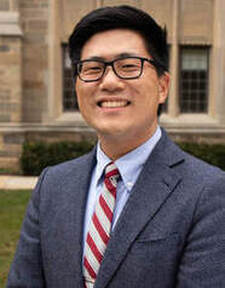
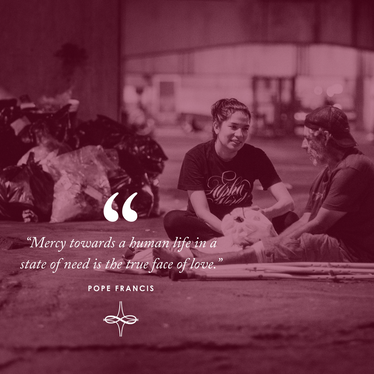
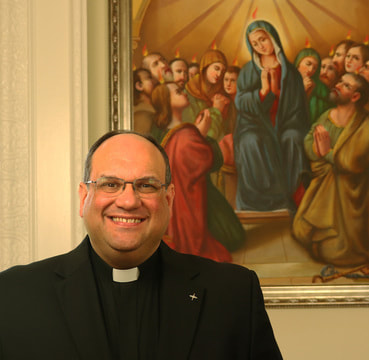


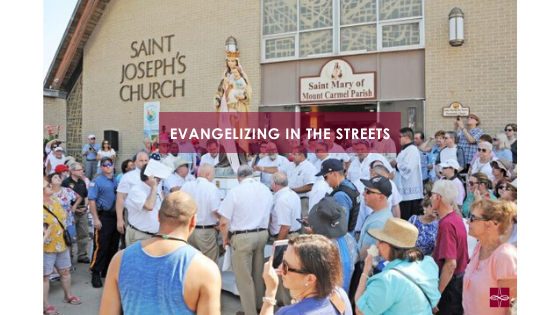
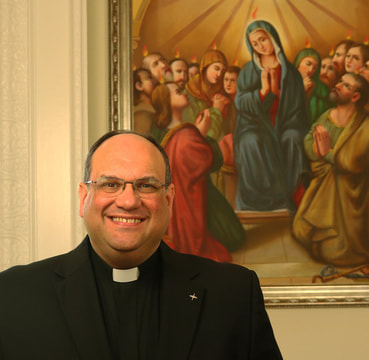
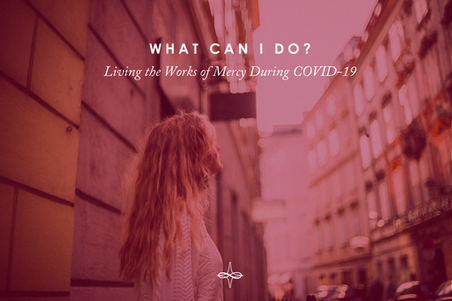

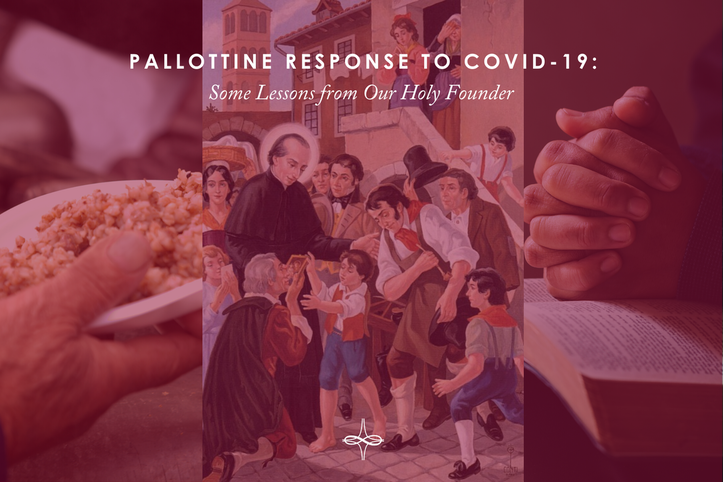
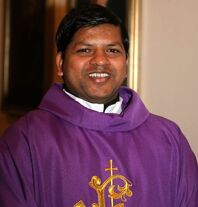
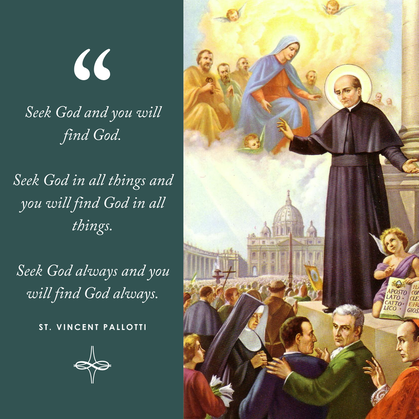
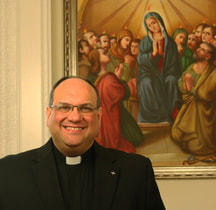
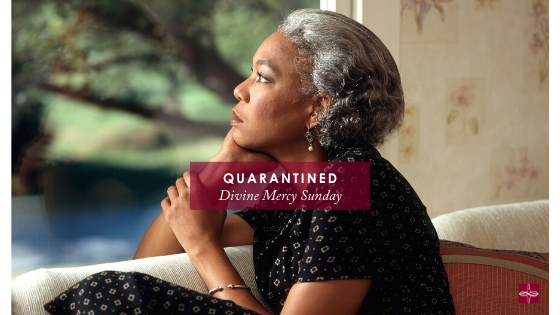


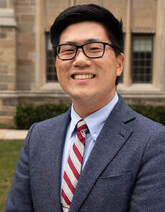
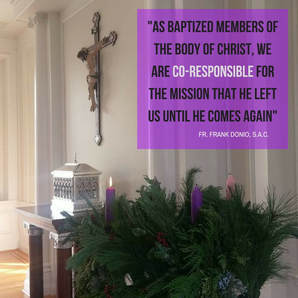
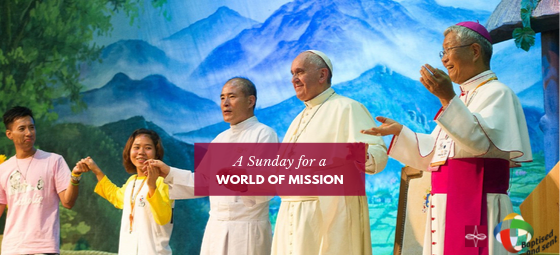



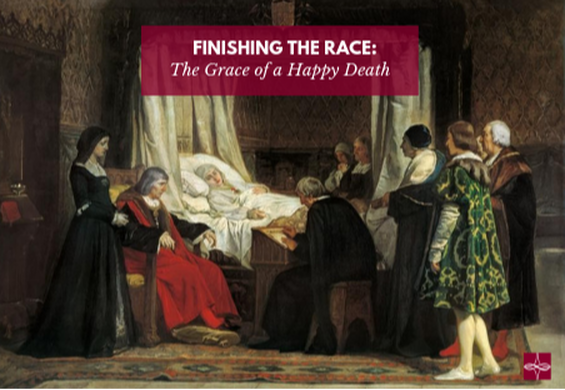

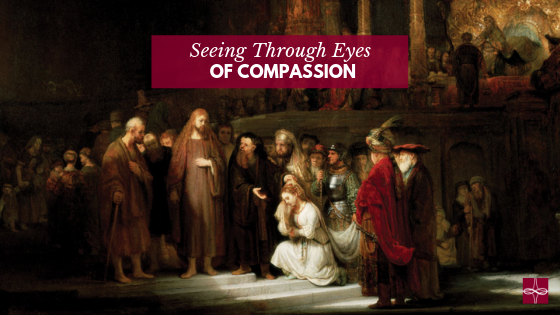

 RSS Feed
RSS Feed